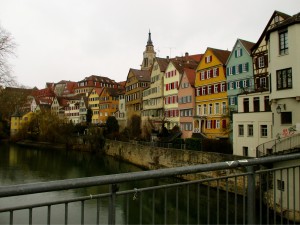As of today, I have been in Reutlingen for exactly three weeks, and finally, I feel settled into a routine. The first two weeks were jam packed with orientation tours and events. I really appreciated this fun-filled welcome, but now it’s time to start conquering the challenges of daily life in a foreign country. That seemed to be the theme of the week.
On Monday, I was quite proud that I figured out how to do laundry here. Back at school, I secretly made fun of the people who had never learned this important life skill before coming to college. However, now I can sympathize with them. Using the German washer went well, up until I couldn’t figure out how to open the door at the end and stood there for 5 minutes panicking that I’d never get my clothes out. Luckily, I figured that one out, and soon moved on to my next challenge: using the dryer. Now, I had already decided that I was going to be a typical American and use the dryer, even though most Germans let their clothes air dry on racks. No, I didn’t have all day to wait, and the liberal German environmentalism was not going to stand in my way! Or so I thought. After paying 1 euro for an hour of drying time and ending up with still-sopping wet clothes, I learned my lesson. Turns out that drying rack will actually come in handy.
On Wednesday, I had another small victory, this time at the grocery store. My all-time favorite recipe to make at home is German cheesecake, made out of a soft cheese called quark. In America, quark is ridiculously expensive and hard to find. In fact, this recipe would normally cost $16 to make. However, quark is everywhere in Germany, and it’s about 8 times cheaper. For this reason, I have always wanted to make this cheesecake in Germany. Today I not only found cheap quark, but every other baking ingredient I needed, plus a springform pan for 6 euros! On Thursday, I successfully baked my cheesecake and must have guessed right on all the conversions because it came out perfectly. I brought some to class, and my German professor gave me her seal of approval! For the recipe, click here.
Over the weekend, the whole group went to Bebenhausen, a tiny town outside Tübingen with a cloister founded in 1183. It’s a gorgeous building with obviously, a long, rich history. Just the thought that something can exist for almost a thousand years is still mind-boggling to me.
On Monday, I was quite proud that I figured out how to do laundry here. Back at school, I secretly made fun of the people who had never learned this important life skill before coming to college. However, now I can sympathize with them. Using the German washer went well, up until I couldn’t figure out how to open the door at the end and stood there for 5 minutes panicking that I’d never get my clothes out. Luckily, I figured that one out, and soon moved on to my next challenge: using the dryer. Now, I had already decided that I was going to be a typical American and use the dryer, even though most Germans let their clothes air dry on racks. No, I didn’t have all day to wait, and the liberal German environmentalism was not going to stand in my way! Or so I thought. After paying 1 euro for an hour of drying time and ending up with still-sopping wet clothes, I learned my lesson. Turns out that drying rack will actually come in handy.
On Wednesday, I had another small victory, this time at the grocery store. My all-time favorite recipe to make at home is German cheesecake, made out of a soft cheese called quark. In America, quark is ridiculously expensive and hard to find. In fact, this recipe would normally cost $16 to make. However, quark is everywhere in Germany, and it’s about 8 times cheaper. For this reason, I have always wanted to make this cheesecake in Germany. Today I not only found cheap quark, but every other baking ingredient I needed, plus a springform pan for 6 euros! On Thursday, I successfully baked my cheesecake and must have guessed right on all the conversions because it came out perfectly. I brought some to class, and my German professor gave me her seal of approval! For the recipe, click here.
Over the weekend, the whole group went to Bebenhausen, a tiny town outside Tübingen with a cloister founded in 1183. It’s a gorgeous building with obviously, a long, rich history. Just the thought that something can exist for almost a thousand years is still mind-boggling to me.
After Bebenhausen, we had some free time to explore Tübingen a little more. Speaking of old buildings, this house was built in 1491!
And of course, I couldn’t resist taking the most classic typical tourist photo of Tübingen. (But I’ll need to come back on a sunny day.)
So that was my week. This Friday, we’re leaving for 5 days in Berlin and 2 in Cologne, so stay tuned for the next post all about it!



Leave a Reply